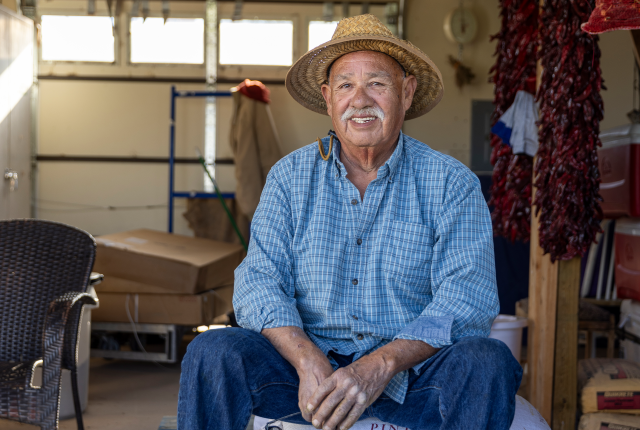FOR JOAQUÍN LUJÁN, delivering freshly roasted green chiles to his neighbors is about more than just filling empty bellies. It’s an organizing strategy. “You start talking about green chile,” he explains, “and you end up talking about the issues that the communities have.”
In recent months, these have included registering to vote, being heard on state water issues, and speaking out for the Downwinders—New Mexicans impacted by the radiation and other negative impacts of nearby atomic testing.
Luján grows much of the food he shares on his four-acre farm in Polvadera, about an hour south of Albuquerque. Despite being 72 and technically retired, he spends busy days tending, harvesting, and delivering thousands of pounds of free food all over central New Mexico. Along with other farmers and his collaborators at the Southwest Organizing Project, he pays special attention to communities without grocery stores and those where elders and other underserved members often don’t have access to fresh food. But for Luján, and the people who receive his produce, it isn’t about charity.
“We’re here to try to help each other,” he says to those who have lived and worked in communities like Tularosa and Carrizozo for generations. “These are different times, and so we have some things to share.” Today those offerings include hundreds of pounds of frijoles and watermelon, yesterday it was peaches and apples, tomorrow it will be squash and corn.
Bringing food to share has helped open doors throughout the region, especially for folks like Bernice Gutierrez, a Carrizozo native. A member of the Tularosa Basin Downwinders Consortium, she goes door-to-door in affected communities to collect health surveys. This, in turn, supports the organization’s work to get more state and federal resources for survivors.
“The produce helps us get in the door,” she explains. “Then the people speak to us because they want their histories known.” Skepticism arises because New Mexico has been routinely excluded from federal programs for survivors of radiation exposure. Advocating to change this is a priority for the Downwinders Consortium, and for Luján. After being part of the Chicano movement in his youth and spending much of his career engaged with environmental justice issues, he’s come to see the experience of the Downwinders as a universal issue that unites all New Mexicans.
Although change can be a slow process, the act of growing and delivering food keeps Luján hopeful. For more than half a decade, he’s seen so many people willing to help—including strangers stopping to unload thousands of pounds of produce and then offering to gas up the truck for the return journey. It reminds him of the simple rule that’s guided much of his work: “El tiempo me saca. Whoever puts in, takes out.”
For now, Luján is staying busy putting in his labor and passion day in and day out. “We still have kids in New Mexico that don’t eat every day, at least not more than once,” he says, opening the acequia gate to begin watering his field, “so we’ve got to keep growing.”



